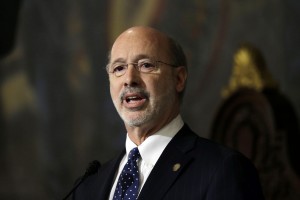Industry warns of negative impacts from Wolf’s gas tax
-
Marie Cusick

Marc Levy / Associated Press
Gov. Wolf made taxing the natural gas industry a central campaign pledge and a key part of his budget proposal.
Governor Wolf’s proposed severance tax on natural gas drilling will cost Pennsylvania thousands of jobs and billions of dollars, according to a report released Thursday by the American Petroleum Institute, the nation’s largest oil and gas trade group.
API projects the governor’s tax will result in 1,364 fewer wells over the next decade, resulting in a cumulative drilling investment loss of $11.5 billion to the state.
“When Pennsylvanians see what this tax could do to a vibrant industry, they’ll have to think twice about it,” says Stephanie Catarino Wissman, head of API’s Pennsylvania division in Harrisburg.
Wolf’s tax proposal is part of his broader budget package. It calls for a five percent tax on the value of the gas, plus 4.7 cents per thousand cubic feet. It would also set a minimum value of $2.97 per thousand cubic feet, regardless of its actual sale price.
“He is setting an artificial price,” says Wissman. “What I equate that to, is someone earning $40,000 a year having to pay the same in income taxes as someone earning $100,000 per year.”
Wolf expects his tax to raise $1 billion in the first year and says he wants to spend much of the money to increase funding to public education.
The API report was authored by Timothy Considine, a professor at the University of Wyoming who co-authored a controversial 2009 Penn State University report on the economic impact of the Marcellus Shale, which was criticized for being biased and failing to disclose its industry funding.
Pennsylvania is the only major gas-producing state without a severance tax. Instead, companies pay an impact fee for each well they drill. So far, it’s brought in an average of $210 million per year. According to an analysis by the state’s Independent Fiscal Office, Pennsylvania has one of the lowest effective tax rates on shale gas in the country.
“A report from the American Petroleum Institute opposing a severance tax and misleading people about the effects of a tax on the industry is not surprising,” says Wolf spokesman Jeff Sheridan. “The reality is members from both parties in the legislature and a majority of Pennsylvanians support a severance tax, and schools across the state desperately need the funding.”
Under state law, a budget must be passed by June 30th, but Harrisburg has missed that deadline many times in the past. Wolf’s budget proposal faces opposition from the Republican-controlled House and Senate, where leaders have criticized it as a massive tax and spend package. They’ve said they want to overhaul the heavily indebted public pension system before discussing any new revenue.
The governor’s plan has also drawn ire from some anti-drilling environmental groups, which worry a new tax will cause the state to become too reliant on gas extraction.
















